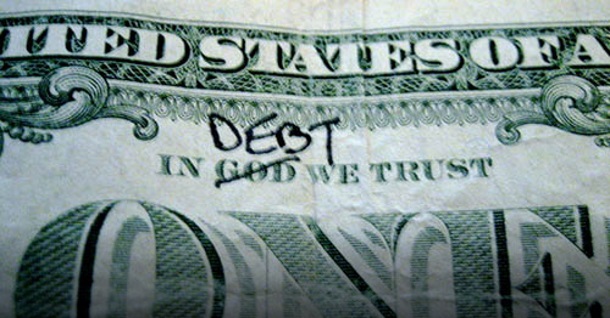
::: Three things cannot be long hidden: the sun, the moon, and the truth:::
Jan 31, 2019
Max Blumenthal: How US trained Juan Guaido for Regime Change
Journalist and author Max Blumenthal offers his analysis of Venezuela’s political crisis. He says Juan Guaido’s “real constituency is in Washington” and that he’s at the forefront of a years-long destabilization campaign orchestrated by the US.
Ah...the more things change, the more they stay the same..
Drugs as Weapons Against Us

.
"One of the artifices of Satan is, to induce men to believe that he does not exist: another, perhaps equally fatal, is to make them fancy that he is obliged to stand quietly by, and not to meddle with them, if they get into true silence".~~Charles Baudelaire
This film is pretty explosive.
Those of you who are more interested in how the black communities were affected, particularly the political organizations, community groups, specific activists & artists, skip to the 1:01:14 mark. The level of subterfuge & wickedness is unimaginable. This film will explode whatever illusions you may have about the music industry, banking, the media & the miliitary-industrial complex.
Stay woke.
Jan 30, 2019
John A. Powell: Co-Creating Alternative Spaces to Heal
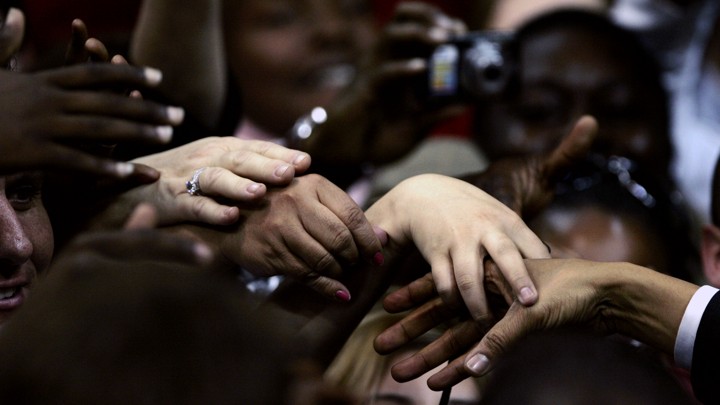
Racialized violence injures all of us — not just those who are being “othered” but also those who perpetuate that “othering.” These painful injuries happen on many levels, including on the individual, structural, and societal spheres, so healing must also happen on many levels, but we can’t truly heal these deep wounds while the injuries are still being perpetuated. Professor John A. Powell, one of the world’s most important thinkers and scholars on civil and human rights, explores how we can better understand the spaces we currently inhabit and strategize to co-create alternative spaces where real healing can truly begin.
Jan 29, 2019
American Liberal Delusions on Trump by Finian Cunningham

.
The anti-Trump so-called “liberal” American politicians and media suffer from a cozy big delusion. The Democrats and their supportive media, such as CNN and New York Times, as well as the foreign policy establishment, including the CIA, promote the belief that all of America’s ills and problems will be solved if only President Trump could be impeached.
The so-called “liberal-left” in the US – which has nothing to do with leftwing or socialist politics as most of the world would define it – is increasingly warning that Trump is taking America into a dark place of authoritarianism.
Take a recent op-ed in the New York Times by columnist Roger Cohen with the headline: ‘Donald Trump Just Cannot Help It’. It’s a scathing piece which lambasts Trump in very personal terms as a “malignant” conman.
The key line perhaps is when Cohen writes: “The Reichstag Fire was at least a fire. Here, there is smoke and mirrors.” He is referring to what many historians contend was a false-flag arson attack on the German parliament in 1933, which allowed newly elected Chancellor Adolf Hitler to install his Nazi dictatorship by claiming the sabotage was a communist plot.
Many critics of Trump, including Cohen, are concerned that the president is “manufacturing a crisis” over his border wall proposal. They accuse him of using the US government shutdown and the political impasse with Democrats on the proposed border wall funding as a pretext to introduce a state of emergency. Cohen’s mention of the infamous Reichstag Fire has therefore a seemingly radical inference. He, and many others in the American liberal-left, are warning that Trump is a crypto-fascist.
There is some merit to that argument. Certainly, Trump seems to be whipping up a crisis about immigration which is not justified in terms of numbers and conditions on the border with Mexico. The influx of migrants and refugees is widely reported to be at an all-time low going back over the past 40 years. Most of the present migrants are families, fleeing poverty and violence in their home countries. Trump’s scary depiction of “drug dealers” and “terrorists” seems to be unabashed fabulation to incite fear.
His threats of invoking a state of emergency in which he will use executive powers to instruct the compulsory building of a security barriers on the southern border are therefore disproportionate and uncalled for. Trump’s would-be arrogation of emergency powers has disturbing implications of overriding US constitutional law, and sidelining other branches of government. There are genuine concerns that the direction is one of authoritarianism, even fascism.
But here is where too many Americans are deluded about Trump. They think he is the singular problem, an aberrant president. Get rid of him, they say, and we can all return to “normal democracy”.
The reality is that the US has been sliding into authoritarianism, plutocracy and oligarchy, or dare we say fascism, for decades. The political figure of Trump – obnoxious as he is – is merely the culmination of this degenerative process in American politics.
The obscenity of American capitalism and its grotesque exploitation of millions of American citizens – creating islands of super wealth among a sea of poverty – is a repudiation of any notion of a functioning democracy. The two-party pimping for big business, Wall Street and the military-industrial racket that has been going on for decades makes a travesty of any claims about “we the people” and elections. This backdrop of actual functioning oligarchy is why many voters – among the half, that is, who bothered to even vote – reached out to “an outsider” like Trump and his conman promises of change.
However, the inherent problem isn’t Trump. It is the system that produces the conditions and precursors for someone like Trump to end up getting elected.
It should be noted that people like Roger Cohen and other American “liberals” who are wringing their hands about Trump never seemed to express concern about the dominance of big business and banks in running America’s corporatocracy. Cohen and his ilk were also big supporters of US wars in Iraq and Afghanistan – wars that were illegal, resulted in millions of innocent casualties, destroyed societies and spread the scourge of terrorism.
How is getting rid of Trump supposed to be a return to “normal democracy”? When that purported “normal democracy” is a myth, a fantasy belied by massive poverty, inequality and oppression of ordinary American workers and their families, alongside criminal imperialist wars of genocide.
Cohen’s reference to the Reichstag Fire false flag and Trump’s propensity for authoritarianism may sound like radical criticism. But it is only radical schtick. It is worse than Trump’s con artistry because it propagates the delusion that America has an underlying democracy. The reality is American democracy stopped functioning a long time ago. When exactly it stopped is debatable.
The 9/11 “terror attacks” in 2001 were certainly a candidate for comparison to the Reichstag Fire false flag event. They ushered in executive powers in Washington to wage criminal wars “against terrorism” anywhere on the planet, and for far-reaching police state surveillance of US citizens.
Or we could go back to the Gulf of Tonkin incident in 1964 when the US created a pretext for the Vietnam War.
Or the assassination of President John F Kennedy in Dallas in November 1963 by his Deep State enemies, which was a coup d’état against American democracy, violating the nation forever.
Or the creation of the Federal Reserve in 1913 which gave private banks and plutocrats the ultimate power over the creation of money in the US and thus a veto on economic policy.
Many other instances (extermination of native Americans, African slavery) could be cited which testify to the fraud of “American democracy”. The seeds of authoritarianism, militarism and fascism were sown decades ago. To blame this putrefaction of democracy on Donald Trump is the delusion of American apologists for the system’s long-time corruption.
Finian Cunningham, is a columnist at the Strategic Culture Foundation, Sputnik, and a Writer on Dandelion Salad. He can be reached at cunninghamfinian@gmail.com.
Jan 28, 2019
Jan 27, 2019
Ray McGovern - Russia-gate: Can You Handle the Truth?

.
Great talk by Ray McGovern, 27-Year Veteran of the CIA and co-founder of Veteran Intelligence Professionals for Sanity, on "Russia-gate: Can You Handle the Truth?" recorded August 4, 2018 at the Common Good Cafe, University Temple United Methodist Church, Seattle.
Anand Giridharadas Delivers a Harsh Message to Rich Pricks
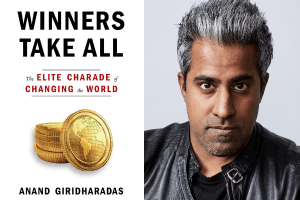
Anand Giridharadas discusses his latest book, Winners Take All: The Elite Charade of Changing the World, an insider’s groundbreaking investigation of how the global elite’s efforts to “change the world” preserve the status quo and obscure their role in causing the problems they later seek to solve.
Jan 25, 2019
James Baldwin: Artist on Fire
.
( This speech was given on January 15th,1979 in Berkeley, California )
James Baldwin is one of the finest writers America has produced. I have posted numerous articles about him & it never gets old as I always discover some new insight in his writing & speeches. This clip has a number of thought-provoking gems to include his freedom from some of the more troubling assumptions embedded in the English language. Starting with a dry, mild questioning of phrases like "black as night," "black-hearted," and "black as sin", Baldwin turns quickly to a critique of the name of the civil rights movement itself, which he suggests would be more accurately described as a slave rebellion. The logic and eloquence with which Baldwin makes his case is much better savored than explained. What really struck me powerfully was at the 8:36 mark when he said:
..a very brutal thing must be said. The intentions of this melancholic country as concerns black people....& anyone who doubts me can ask any Indian.....have always been genocidal. They needed us for labor & for sport. Now, they can't get rid of us. We cannot be exiled...& we cannot be accommodated. Now something's got to give. The machinery of this country operates day in & day out, hour by hour until this hour to keep a nigger in his place.
Good Lord! The man saw right though the dark, diseased heart of the Beast & held nothing back!! Shit, he also gave us the intellectual & spiritual ammunition to slay the m*f*er!!
Let's get to work!
Jan 23, 2019
The United States of Greed and Bullies by Rivera Sun

A nation built on greed is not a nation; it is just a legal framework for rape and pillage, slavery and exploitation, theft, murder, and genocide. A nation whose primary function is to protect the exclusive right of the rich to engage in those behaviors under other names has no more moral legitimacy than the lawless state that allows common criminals to run wild. Greed by any other name smells just as foul. Greed cloaked in terms of “national security” or “for the good of the economy” is just as detestable as the greed that steals toys from children and purses from old women.
Greed is not a founding principle for a long-lasting society. It is the calling card of tyrants. It heralds the end stages of empires. It is the character flaw of villains. It is the symptom of sociopaths. The greed of the rich and powerful, particularly the corporate elites, has reached such magnitude that it outstrips our ability to describe it. We have no word for a theft so massive that it robs the ecological savings of eons, enslaves seven billion people to the machinery of profit-production, and steals the future existence of millions of species, including our own. It is genocide, ecocide, and slavery all rolled into one. It steals not just resources and lives, but thoughts, dreams, hopes, happiness, freedoms, and possibilities. All of these are chained to the production of profit for a small elite.
Every aspect of our human existence is mined for profit. Our thoughts. Our insecurities. Our longings. Our desires. Our sensuality and sexuality. Our health. Our sickness. Our fear, communications, visions, charity, and all other qualities. We are mined for any shred of human existence that could generate the smallest percentage of profit for the rich and powerful. They mine our personal histories. They mine our present data. They mine our future through debt.
Mine. Mine. Mine.
This greed has no name. There are no limits to its pathology. The economic system constructed by the unbridled greed of the elites trains us to replicate its values. It is like being held under water until we learn to fight for a single breath of air. Greed is not “normal” for humanity. We are not born with a hoarding instinct. If we were born with unbridled greed we would never stop sucking at our mother’s breast until her entire lifeblood is drained into our engorged bellies. Greed is not an evolutionary sound principle. Instead, something makes most infants stop at satiation point. That something makes us human. The greed of contemporary civilization is inhumane. It makes us into monsters.
We have a name for children who behave in this way: bullies. A bully invades another child’s yard and takes all their toys. A bully patrols the playground forcing other children to pay lunchbox tolls to enter. A bully uses violence to get what they want. A bully terrorizes and intimidates to maintain their power and position. A bully refuses to share and play with others.
When bullies are lauded as the great leaders of a nation, that nation has lost all worth. When bullies are celebrated as icons, that nation’s culture has lost its soul. When bullies are empowered by law rather than constrained by law, that nation’s legal system has become the tool of tyranny.
Our nation is a land of psychotic greed and bullies. It is up to us to change it. Every moment of every day, we must draw lines in the sand – the sand of the heart, the sand of our minds, the sand of our streets and workplaces. We must push back against the behaviors that this greed-and-bully culture has violently pounded into us. We must free ourselves from these mental chains, recognizing them as the enslavements that they are. We must call a spade, a spade. We must call a bully, a bully. We must reject our culture’s hero worship of the rich and powerful. Instead, we must see these people for the depraved criminals that they are.
Every fortune is millions of hungry children. Every mansion is thousands of homeless people sleeping in the street. Every sports car is hundreds of families stretching to make ends meet. Until we see excessive wealth as a cruelty when others cannot even survive, we will be a hollow nation, vacuous of any real meaning or worth. Until we love our country enough to care for it – each and every single citizen, tree, river, animal, and plant of it; the past, present, and future of it; the heart, spirit, and soul of it – until we love our country enough to topple greed from its enshrinement in our nation’s policies and practices, we will never be able to lift our heads with honest pride. Until we stop our leaders from bullying and our bullies from becoming leaders, we will never become the nation that we are meant to be.
We will never be great. We will never be strong. We will never even be human until we have left the ways of greed and bullies behind.
***********************************************************************************************************************
***********************************************************************************************************************
Rivera Sun is a change-maker, a cultural creative, a protest novelist, and an advocate for nonviolence and social justice. She is the author of The Dandelion Insurrection, The Way Between and other novels. Her study guide to making change with nonviolent action is used by activist groups across the country
Poet's Nook: "Only by Love" by ......(unknown).....

For silence is not God, nor speaking;
fasting is not..... God, nor eating;
solitude is not God, nor company;
nor any other pair of opposites.
He is hidden between them,
and cannot be found by anything your soul does,
but only by the love of your heart.
He cannot be known by reason,
he cannot be thought, caught,
or sought by understanding.
But he can be loved and
chosen by the true, loving will of your heart.
To put it more simply, let that mysterious grace move in your spirit as it will and follow wherever it leads you. Let it be the active doer and you the passive receiver. Do not meddle with it, but let it be... Your part is to be as wood to a carpenter or a home to a dweller. Remain blind during this time cutting away all desire to know, for knowledge is a hindrance here. Be content to feel this mysterious grace sweetly awaken in the depths of your spirit. Forget everything...
~ The Cloud of Unknowing
Jan 22, 2019
Confronting the Culture of Death by Chris Hedges
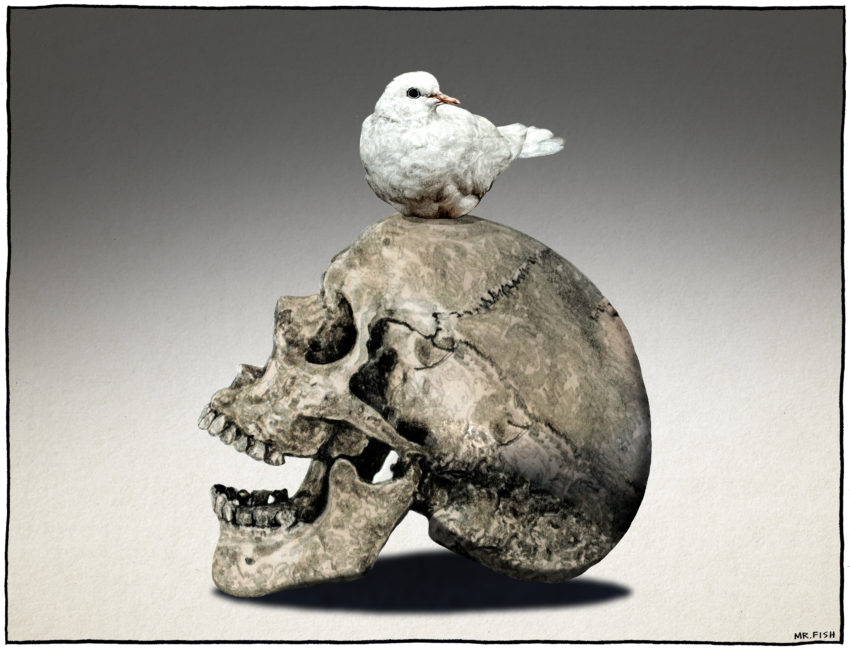
The issue before us is death. Not only our individual death, which is more imminent for some of us this morning than others, but our collective death. We have begun the sixth great mass extinction, driven by our 150-year binge on fossil fuel. The litany of grim statistics is not unfamiliar to many of you. We are pouring greenhouse gases into the atmosphere at 10 times the rate of the mass extinction known as the Great Dying, which occurred 252 million years ago. The glaciers in Alaska alone are losing an estimated 75 billion tons of ice every year. The oceans, which absorb over 90 percent of the excess heat trapped by greenhouse gases in the atmosphere, are warming and acidifying, melting the polar ice caps and resulting in rising sea levels and oxygen-starved ocean dead zones. We await a 50-gigaton burp, or “pulse,” of methane from thawing Arctic permafrost on the east Siberian arctic shelf which will release about two-thirds of the total carbon dioxide pumped into the atmosphere since the beginning of the Industrial Era. Some 150 to 200 species of plant, insect, bird and mammal are going extinct every 24 hours, one thousand times the “natural” or “background” rate. This pace of extinction is greater than anything the world has experienced since the disappearance of the dinosaurs 65 million years ago. Ultimately, feedback mechanisms will accelerate the devastation and there will be nothing we can do to halt obliteration. Past mass extinctions on earth were characterized by abrupt warming of 6 to 7 degrees Celsius. We are barreling toward those numbers. The mathematical models for this global temperature rise predict an initial 70 percent die-off of the human species, culminating with total death.
The corporate forces that have commodified the natural world for profit have also commodified human beings. We are as expendable to global corporations as the Barrier Reef or the great sequoias. These corporations and ruling elites, which have orchestrated the largest transference of wealth upward in human history, with globe’s richest 1 percent owning half the world’s wealth, kneel, and force us to kneel, before the dictates of the global marketplace. They have seized control of our governments, extinguishing democracy, corrupting law and building alliances with neofascists and authoritarians as the ruling ideology of neoliberalism is exposed as a con. They have constructed pervasive and sophisticated systems of internal security, wholesale surveillance and militarized police, along with criminalizing poverty, to crush dissent.
These corporate capitalists are the modern versions of the Canaanite priests who served the biblical idol Moloch, which demanded child sacrifice. And, as in this ancient Canaanite religion it is our children who are being sacrificed to these “mute idols,” as 1 Corinthians puts it. Their future is being taken from them. These corporate forces are, in biblical terms, forces of death. They will, unchecked, create more human misery and death than the evils of Nazism and Stalinism combined.
“Actually, I hardly feel constrained to try and make head or tail of this condition of the world,” Walter Benjamin wrote. “On this planet a great number of civilizations have perished in blood and horror. Naturally, one must wish for the planet that one day it will experience a civilization that has abandoned blood and horror; in fact, I am … inclined to assume that our planet is waiting for this. But it is terribly doubtful whether we can bring such a present to its hundred or four-hundred-millionth birthday party. And if we don’t, the planet will finally punish us, its unthoughtful well-wishers, by presenting us with the Last Judgment.”
Religious belief, to be relevant, must be grounded in this concrete and bitter human reality. It must name radical evil, not as an amorphous theological concept, but as Christ did when he named the evils of the rich, the Pharisees and the Roman Empire. It must eschew self-preservation, for only he who loses his life can save it, in the mortal struggle against the forces of death. It must speak in a negative, critical voice, like the Hebrew prophets, condemning the dominant corporate culture. The point of faith is not to give us hope. It is to name and defy the forces of death. Faith is not centered around the question “How is it with me?” This is part of the narcissism of the dominant culture. Faith does not reside in infantile fantasies about inevitable human progress or personal schemes for unachievable happiness. Faith defies magical thinking. It defies our cultural and historical amnesia. It is the counterweight to the conditioned helplessness peddled by mass culture, the flight from reality that ensures our capitulation and our immolation on the altar of Moloch. Faith, finally, is about the belief, as Daniel Berrigan once told me, that the good draws to it the good, even if all the empirical evidence around us says otherwise. We demand justice not because we will win, but because we must.
Corporate culture, like all cultures of death, makes war on love, truth, justice and beauty and numbs us to the questions about the search for meaning and the struggle to face our mortality. It spreads the dark viruses of hedonism, sexual sadism, greed, the cult of the self, the lust for power, hyper-masculinity and the glorification of violence. It seeks to crush the transcendent. It lacks the capacity for empathy, awe and reverence. It is the enemy of the sacred. Nothing in life has an intrinsic value beyond a monetary value in this culture of death. All living entities are herded toward Moloch’s altar. The only ethical and religious response is to smash the idols and drive the high priests from Moloch’s temple.
“The nothingness into which the West is sliding is not the natural end, the dying, the sinking of a flourishing community of peoples,” Dietrich Bonhoeffer wrote in “Ethics.” “Instead, it is again a specifically Western nothingness: a nothingness that is rebellious, violent, anti-God, and anti-human. Breaking away from all that is established, it is the utmost manifestation of all the forces opposed to God. It is nothingness as God; no one knows its goal or its measure. Its rule is absolute. It is a creative nothingness that blows its anti-God breath into all that exists, creates the illusion of waking it to new life, and at the same time sucks out its true essence until it too disintegrates into an empty husk and is discarded. Life, history, family, people, language, faith—the list could go on forever because nothingness spares nothing—all fall victim to nothingness.”
Religion, as H. Richard Niebuhr wrote, is a good thing for good people and a bad thing for bad people. And religion as seen in the Christian right, which articulates and promotes white supremacy and Christian fascism, now rapidly filling Donald Trump’s ideological void, is anti-religious. The idol of a personal god, one that caters to and promotes the interests of those who profess homage to it, is the idolatry of Moloch. It is self-worship. It is heretical. And one of the most egregious failures of the liberal church has been its refusal to denounce these Christian heretics. The tacit toleration of these Christian heretics gave them religious legitimacy. You do not need to, as I did, spend three years at Harvard Divinity School to understand that Jesus did not come to make us rich, did not bless the white race above other races—Jesus, after all, was a person of color; it was the Romans who were white—or sanctify the American Empire’s dropping of iron fragmentation bombs for 18 years up and down the Middle East. This is the theology of the Antichrist, as we heard in the reading this morning from the Book of John. It speaks only to itself.
Those we battle as the society and the ecosystem disintegrate will increasingly appropriate the language of religion. They will seek to sanctify evil. These Christian fascists, like all idol worshippers, endow themselves with absolute power and authority. They claim to speak and act for God. They externalize evil. Evil, for them, is not the constant struggle to combat the dark forces within our own hearts but is embodied in the demonized other—Muslims, immigrants, blacks, feminists, artists, intellectuals or homosexuals—and once the other is eradicated, evil itself will somehow miraculously be eradicated; except of course it won’t, and these Manicheans will, in frustration, oppress and kill new groups of demonized human beings with an even greater fury. These beliefs, common to all fundamentalists, who can come in secular form as we see with the New Atheists, are the ideological cover for an emerging dystopia.
We will endure only by inverting the world’s values. To resist radical evil saves us, as Søren Kierkegaard wrote, from slipping into that “loathsome void,” that “torment of despair.” Hope comes by way of defeat. When we pit ourselves against the culture of death—and this means performing acts of civil disobedience and noncompliance, it means becoming an outlaw in the eyes of the corporate state—then suffering, and even death, does not have the last word.
Alexander Solzhenitsyn in “The Gulag Archipelago” describes prisoners in his camp organizing a work stoppage and hunger strike. He writes:
What the bosses would do no one could predict. We thought that perhaps they would start firing on the huts again from the towers. The last thing we expected was any concession. We had never in our lives wrested anything from them, and our strike had the bitter tang of hopelessness.But there was a sort of satisfaction in this feeling of hopelessness. We had taken a futile, a desperate step, it could only end badly—and that was good. Our bellies were empty, our hearts were in our boots—but some higher need was being satisfied. During those long hungry days, evenings, nights, three thousand men brooded over their three thousand sentences, their families, their lack of families, all that had befallen and would yet befall them, and although the hearts in thousands of breasts could not beat together—and there were those who felt only regret, only despair—yet most of them kept time: Things are as they should be! We’ll keep it up to spite you! Things are bad! So much the better!
This struggle to nurture and protect life, the sacred, has always been Pyrrhic. But it is our call, the cross we are commanded to carry. It is what makes us human. It is what sustains the dim, absurd compassion and human kindness, love itself, which evil, with its machines and bureaucratic power, its armies, its lies, its industrial violence, its wealth and its vast megaphones, has never been able to crush and never will. It may not be a battle we can win. But by fighting it we sustain our selves, we are enveloped and absolved by the sacred, by God. We make faith possible. The poet Linda Gregg writes [in “Chosen by the Lion: Poems”]:
In the museum print room today we looked
at their Blake engravings. All were
about a place that was not Paradise.
Everybody suffering. Men on their backs,
their faces upside-down and exposed,
legs raised and merging with the lines
that meant a mountain.
Women, unusually large, stood composed,
discerning, concerned over the general
condition of life. The curator said,
“He cut directly into the metal,”
“Then inked it,” I said. “Yes,” she said.
There was a spiral of mist
Filled with the shapes of lovers.
I looked close to see if any were happy.
At least two were. And in the sky,
A couple sitting, embracing.
(Something weeps in me all the time
All the time.) I said, at random,
“Wouldn’t it be nice if one of these
prints showed an angel crossing the border
Between heaven and this other realm.
Just the border.”
(Jesus, you who are above all others,
I hurt constantly inside.
Bleared with loneliness.
Exhausted by keeping what I love safe.)
Jan 21, 2019
Truth At Last: The Assassination of Martin Luther King
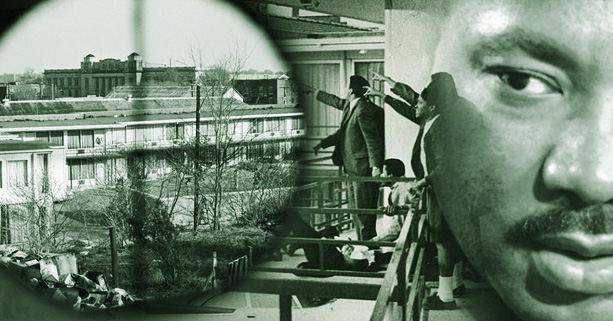
Truth, crushed to earth, shall rise again; The eternal years of God are hers; But Error, wounded, writhes with pain, And dies among his worshippers. ~~William Cullen Bryant
A Conversation with James Baldwin & Nikki Giovanni
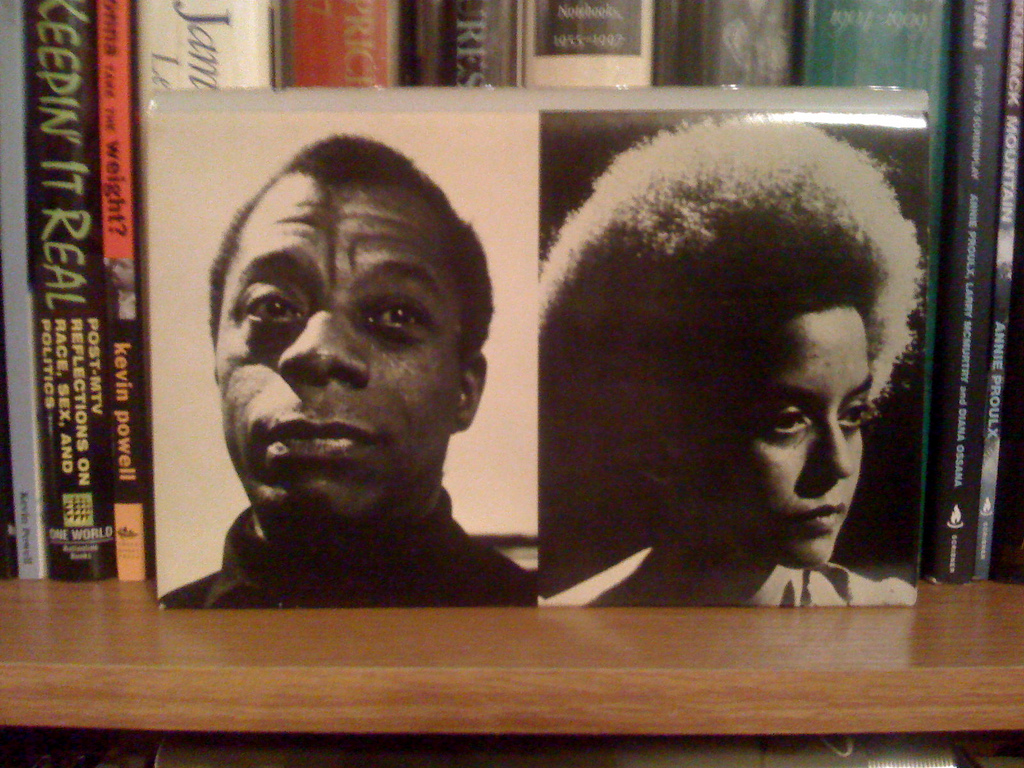
In November of 1971, James Baldwin (August 2, 1924–December 1, 1987) sat down with another extraordinary woman, the poet Nikki Giovanni (b. June 7, 1943), for a conversation of astonishing timeliness today. For hours of absolute presence, intellectual communion, and occasional respectful rebuttal, they explored justice, freedom, morality, and what it means to be an empowered human being. The transcript was eventually published as A Dialogue (public library).
I was truly blown away by this rare footage of two literary & intellectual giants!
“To be honest today in this tinsel America,” the trailblazing African American journalist Ida Lewis writes in the preface of A Dialogue , “one must be willing to put one’s soul on the line” — an observation even truer amid our present global tinsel of ready-made opinions, packaged and flung across at the other side, in a divisive culture where there is always an other side. Lewis saw the dialogue between Baldwin and Giovanni as an effort to “begin to draw upon each other’s strengths rather than wallow in each other’s weaknesses” — an effort all the more urgent today.
The last time I read or saw dialogue between a man & a woman on this level, in this way was when Bell Hooks & Cornel West delivered "Breaking Bread: Insurgent Black Intellectual Life" which had a huge impact on me.
Throughout this conversation, many piercing, prescient observations were made by both which are as relevant today as back then. One of the gems that stood out for me (there were many!) was when Baldwin spoke of the most heartbreaking and pernicious way in which all bigotry infiltrates the psyche and shrinks it from the inside:
I was truly blown away by this rare footage of two literary & intellectual giants!
“To be honest today in this tinsel America,” the trailblazing African American journalist Ida Lewis writes in the preface of A Dialogue , “one must be willing to put one’s soul on the line” — an observation even truer amid our present global tinsel of ready-made opinions, packaged and flung across at the other side, in a divisive culture where there is always an other side. Lewis saw the dialogue between Baldwin and Giovanni as an effort to “begin to draw upon each other’s strengths rather than wallow in each other’s weaknesses” — an effort all the more urgent today.
The last time I read or saw dialogue between a man & a woman on this level, in this way was when Bell Hooks & Cornel West delivered "Breaking Bread: Insurgent Black Intellectual Life" which had a huge impact on me.
Throughout this conversation, many piercing, prescient observations were made by both which are as relevant today as back then. One of the gems that stood out for me (there were many!) was when Baldwin spoke of the most heartbreaking and pernicious way in which all bigotry infiltrates the psyche and shrinks it from the inside:
It’s not the world that was my oppressor, because what the world does to you, if the world does it to you long enough and effectively enough, you begin to do to yourself. You become a collaborator, an accomplice of your own murderers, because you believe the same things they do. They think it’s important to be white and you think it’s important to be white; they think it’s a shame to be black and you think it’s a shame to be black. And you have no corroboration around you of any other sense of life.Power without some sense of oneself is to me another kind of instability, and black people would then become exactly what white people have become.Towards the end,some closing ideas concerning love & responsibility had me captivated & I so wished that this could have been expanded upon. It's a tragedy that rare footage like this is not more widely known, but in some ways though the medium of Hip Hop culture, Baldwin & Giovanni's groundbreaking ideas are being spread far & wide by the likes of Ursula Rucker, Nas, Kendrick Lamar, Mos Def, Talib Kweli & Saul Williams.
Jan 20, 2019
Outside the White Newsroom
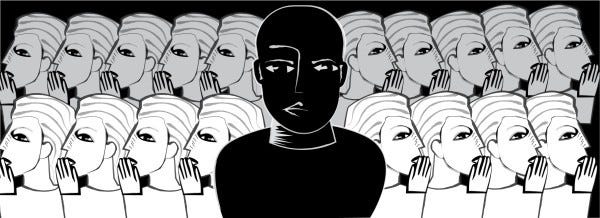
Journalist Aaron Miguel Cantú explains what a White press won't write about White supremacy - from the newsmedia's unwillingness to confront the oppressive structures at the foundation of American society and within its own industry, to the ways 'impartiality' lets journalists off the hook for their own, collective blindspots when it comes to seeing color in American life.
Aaron wrote the article The Whitest News You Know for The Baffler.
Two New Reports Point to Further US Decline & Higher Risk of War by James ONeill
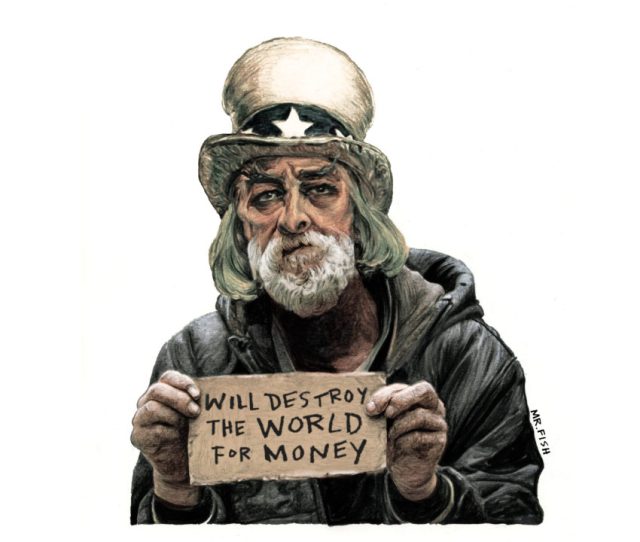
Two recent reports from the United States strongly suggest the United States is planning a major war with Russia and China, but are far from certain that they could in fact succeed in such a war. The reports also provide insights into how the United States will meet the budgetary demands of such war preparations, but almost zero appreciation of the social and human costs of such policies.
The first of these reports is entitled “Providing for the Common Defence” (November 2018). It is the report prepared for the purpose of assessing the National Defence Strategy document released in early 2018.
It acknowledges that changes “at home and abroad are diminishing US military advantages,” and that this diminution of these “advantages” poses a threat to “vital United States interests.”
Geopolitical shifts in the regional power structures are “undermining deterrence of United States adversaries and confidence of United States allies, thus increasing the likelihood of military conflict”. Should such a conflict eventuate, the United States could “suffer unacceptably high casualties and a loss of major capital assets.”
The report says that “America is losing its advantage in key war fighting areas such as air and missile defence, cyber and space operations, anti-surface and anti- submarine warfare, long range ground-based fires, and electronic warfare”.
It further acknowledges that “America’s edge is diminishing or has disappeared in many key technologies that underpin US military superiority”.
Such frankness is not without precedent in US strategy papers and the implications of the above quotations are a probable reason why the report has received almost zero coverage in the western mainstream media.
Acknowledgements of technological deficiency and strategic disadvantage do not sit comfortably with the image of an all-powerful America willing and able to defeat any threat to its own global interests or those of its allies. The latter prefer the comfortable delusion of an omnipotent US “umbrella.”
The Commission’s strategy for addressing this perceived falling behind and consequent loss of military omnipotence is however itself fatally flawed. The proposed “solution” is to spend vastly greater sums of money at a rate of 3-5% above inflation.
That means that a significantly greater share of the federal budget would have to be devoted to military spending. The only way that could be achieved, given that the United States government already has a huge growing deficit ($22 trillion and counting) would have to come, the report acknowledges, by cuts to social spending such as pensions, Medicare and social security. The “trade-offs” the report acknowledges will be “difficult”, a statement that seriously under- estimates the social devastation that such cuts would bring about.
This argument is put forward in a society which already spends more on defence than that spent by the next eight national military budgets combined. United States national infrastructure, in everything from bridges to schools is already crumbling; and these proposals will only accelerate that downward trend.
It does not seem to occur to the report writers that the entire premise that the United States should maintain its attempt to control the world for the benefit of the United States is neither desirable nor wanted by the vast majority of the worlds nations as evidenced by multiple UN General Assembly resolutions.
The second report is issued by the United States Government Accountability Office (GAO) and is entitled: National Security: Long Range Emerging Threats Facing the United States as Identified by Federal Agencies (December 2018.) It has received even less publicity then the ‘Providing for the Common Defence’ document.
The probable reason for this mainstream media reticence is because the GAO report actually details where the United States is lagging in military capability viz a viz its two perceived principal rivals: Russia and China.
The fact of relative military weakness is not new. Andrei Martyanov in his book Losing Military Supremacy (2018) provided a detailed analysis of why Russian military technology was superior to the United States in several important fields. What Martyanov said about Russia applies with equal validity to Chinese technology.
Martyanov’s argument was dramatically illustrated by President Putin’s 1st March 2018 address to the Russian Parliament. The initial American reaction was to discount Putin’s claims, although within days the military industrial complex was demanding more funds to counteract the superiority of Russian weaponry outlined in Putin’s speech.
The GAO Report now provides an authoritative acknowledgement that Putin was not bluffing. Under the section of the report headed “Weapons” it has this to say:
Hypersonic weapons. China and Russia are pursuing hypersonic weapons because their speed, altitude, and maneuverability may defeat most missile defence systems, and they may be used to improve long range conventional and nuclear strike capabilities. There are no existing countermeasures.
Missiles. Adversaries are developing missile technology to attack the United States in novel ways and challenge US missile defence, including conventional and nuclear ICBMs, sea launched land attack missiles, and space based missiles that could orbit the earth.
Aircraft. China and Russia are developing new aircraft, including stealth aircraft, which could fly faster, carry advanced weapons, and achieve greater ranges. Such aircraft could force US aircraft to operate at further distances and put more US targets at risk.
There is more in the same vein. The only caveat to add to those points is the use of the conditional tense. The use of such words as “may” or “could” is redundant. That technology is already operational (www.thesaker.is 1 March 2018).
A number of commentators have argued that the technology gap between Russian and Chinese systems and that of United States is now measured in decades. There is no evidence to suggest this gap could be bridged in the foreseeable future. A more likely scenario is that the technological gap could widen.
Although there are powerful voices in the United States administration and ‘deep state’ generally sufficiently delusional and frankly crazy enough to believe that the United States could “win” a nuclear war with Russia and/or China, the GAO report should act as a constraint on their wilder ambitions.
History demonstrates that it is unwise to underestimate the extent to which the United States will go to maintain its self appointed role is the world’s dominant hegemon, (see Michael Pembroke’s Korea (2018). The reality is that the era of United States dominance is now well past.
Rather than risk a nuclear war that would wreak unimaginable losses upon all the world’s peoples, including for the first time the United States, the more likely scenario will be an intensification of what Andrei Korybko calls ‘hybrid warfare.’ A current illustration of this is the campaign being waged against Huawei, ostensibly because of the potential for Chinese cyber espionage but in reality to weaken and undermine China’s 2025 program for leadership in artificial intelligence, quantum information and other sophisticated technologies, and enforce America’s allies to buy their inferior products.
Proxy wars in the Middle East, Africa, Asia and Latin America are also likely to increase exponentially.
These two reports demonstrate that the United States has lost its previous technological and military superiority, but equally, that it is willing to go to extraordinary lengths to prevent any further erosion of its world wide role and its replacement by the two emerging countervailing superpowers, Russia and China. Whether or not that American determination will tip the world into a catastrophic nuclear exchange will be one of the major questions for 2019.
(Source: New Eastern Outlook
Jan 18, 2019
The Wisdom of Hermann Hesse
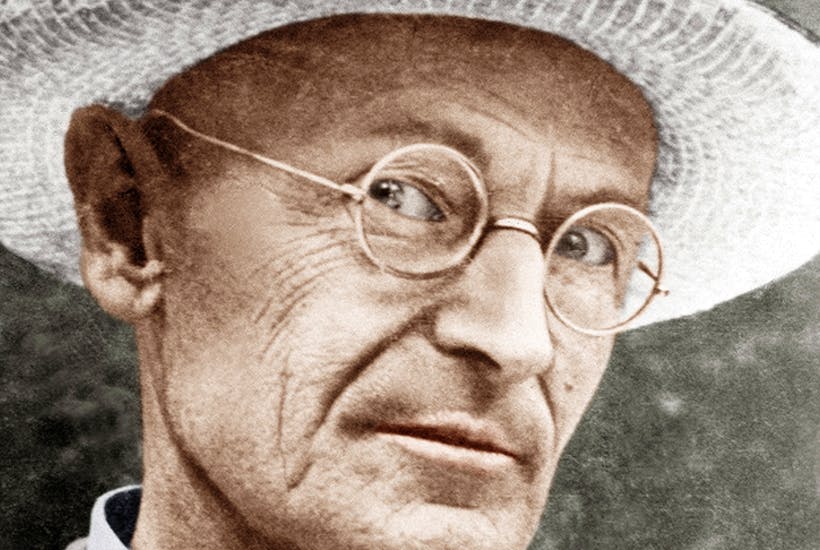
“No one can build you the bridge on which you, and only you, must cross the river of life,” the young Nietzsche wrote as he contemplated what it takes to find oneself. Somehow, this man of stark contradiction, cycling between nihilistic despondency and electric buoyancy along the rim of madness, has managed to inspire some of humanity’s most surefooted spirits — among them, the great German poet, novelist, painter, and Nobel laureate Hermann Hesse (July 2, 1877–August 9, 1962), who drew from Nietzsche’s philosophy the most humanistic ideas, then magnified them with his own transcendent humanity.
Some of Hesse’s most emboldening ideas about our human responsibility to ourselves and the world unfold in his “Letter to a Young German,” written to a dispirited youth in 1919 and later included in his 1946 anthology If the War Goes On… (public library), published the year he received the Nobel Prize — the same stirring piece that gave us Hesse on hope, the difficult art of taking responsibility, and the wisdom of the inner voice.
Decades before E.E. Cummings asserted that “to be nobody-but-yourself — in a world which is doing its best, night and day, to make you everybody else — means to fight the hardest battle which any human being can fight,” Hesse writes:
You must unlearn the habit of being someone else or nothing at all, of imitating the voices of others and mistaking the faces of others for your own.
[…]
One thing is given to man which makes him into a god, which reminds him that he is a god: to know destiny.
[…]
When destiny comes to a man from outside, it lays him low, just as an arrow lays a deer low. When destiny comes to a man from within, from his innermost being, it makes him strong, it makes him into a god… A man who has recognized his destiny never tries to change it. The endeavor to change destiny is a childish pursuit that makes men quarrel and kill one another… All sorrow, poison, and death are alien, imposed destiny. But every true act, everything that is good and joyful and fruitful on earth, is lived destiny, destiny that has become self.
Echoing Nietzsche’s insistence that a fulfilling life requires embracing rather than running from difficulty, Hesse exhorts the young to treat their suffering with respect and curiosity, and adds:
Might your bitter pain not be the voice of destiny, might that voice not become sweet once you understand it?
[…]
Action and suffering, which together make up our lives, are a whole; they are one. A child suffers its begetting, it suffers its birth, its weaning; it suffers here and suffers there until in the end it suffers death. But all the good in a man, for which he is praised or loved, is merely good suffering, the right kind, the living kind of suffering, a suffering to the full. The ability to suffer well is more than half of life — indeed, it is all life. Birth is suffering, growth is suffering, the seed suffers the earth, the root suffers the rain, the bud suffers its flowering.
In the same way, my friends, man suffers destiny. Destiny is earth, it is rain and growth. Destiny hurts.
Long before Simone Weil contemplated how to make use of our suffering, Hesse holds up hardship as “the forge of destiny” and adds:
It is hard to learn to suffer. Women succeed more often and more nobly than men. Learn from them! Learn to listen when the voice of life speaks! Learn to look when the sun of destiny plays with your shadows! Learn to respect life! Learn to respect yourselves! From suffering springs strength…
Writing fifteen years after he made his exquisite case for breaking the trance of busyness, Hesse returns to the sandbox of selfhood — solitude:
True action, good and radiant action, my friends, does not spring from activity, from busy bustling, it does not spring from industrious hammering. It grows in the solitude of the mountains, it grows on the summits where silence and danger dwell. It grows out of the suffering which you have not yet learned to suffer.
[…]
Solitude is the path over which destiny endeavors to lead man to himself. Solitude is the path that men most fear. A path fraught with terrors, where snakes and toads lie in wait… Without solitude there is no suffering, without solitude there is no heroism. But the solitude I have in mind is not the solitude of the blithe poets or of the theater, where the fountain bubbles so sweetly at the mouth of the hermit’s cave.
Learning to be nourished by solitude rather than defeated by it, Hesse argues, is a prerequisite for taking charge of our destiny:
Most men, the herd, have never tasted solitude. They leave father and mother, but only to crawl to a wife and quietly succumb to new warmth and new ties. They are never alone, they never commune with themselves. And when a solitary man crosses their path, they fear him and hate him like the plague; they fling stones at him and find no peace until they are far away from him. The air around him smells of stars, of cold stellar spaces; he lacks the soft warm fragrance of the home and hatchery.
[…]
A man must be indifferent to the possibility of falling, if he wants to taste of solitude and to face up to his own destiny. It is easier and sweeter to walk with a people, with a multitude — even through misery. It is easier and more comforting to devote oneself to the “tasks” of the day, the tasks meted out by the collectivity.
In a sentiment the poet May Sarton would echo in her stunning ode to solitude two decades later, Hesse adds:
Solitude is not chosen, any more than destiny is chosen. Solitude comes to us if we have within us the magic stone that attracts destiny.
Two millennia after Seneca admonished that “all your sorrows have been wasted on you if you have not yet learned how to be wretched,” Hesse exults:
Blessed be he who has found his solitude, not the solitude pictured in painting or poetry, but his own, unique, predestined solitude. Blessed be he who knows how to suffer! Blessed be he who bears the magic stone in his heart. To him comes destiny, from him comes authentic action.
In consonance with Seamus Heaney’s lyrical insight that “the true and durable path into and through experience involves being true… to your own solitude, true to your own secret knowledge,” Hesse addresses the young:
You were made to be yourselves. You were made to enrich the world with a sound, a tone, a shadow.
[…]
In each one of you there is a hidden being, still in the deep sleep of childhood. Bring it to life! In each one of you there is a call, a will, an impulse of nature, an impulse toward the future, the new, the higher. Let it mature, let it resound, nurture it! Your future is not this or that; it is not money or power, it is not wisdom or success at your trade — your future, your hard dangerous path is this: to mature and to find God in yourselves.
A century later, the entire piece remains a spectacular and deeply insightful read, as does the whole of Hesse’s If the War Goes On…. Complement this particular fragment with Ursula K. Le Guin on suffering and the other side of pain, Louise Bourgeois on how solitude enriches creative work and Elizabeth Bishop on why everyone should experience at least one long period of solitude in life, then revisit Hesse on the discipline of savoring life’s little joys, why books will survive all future technology, the three types of readers, and what trees teach us about belonging and life.
Click here for more of Hesse's timeless wisdom.
Jan 17, 2019
Jan 16, 2019
On Being

(Download SoundCloud here)
I thoroughly enjoy listening to these thought-provoking conversations about the big questions of meaning, hosted by Krista Tippett. Try to listen to a couple of them every day on your way to work. It will deepen your understanding of many things....
Dig deeper here.
Subscribe to:
Posts (Atom)
Technocapitalism: Bitcoin, Mars, and Dystopia w/Loretta Napoleoni
We are living through an incipient technological revolution. AI, blockchain, cryptocurrencies, commercial space travel, and other i...

-
Source: Caitlin's Newsletter One of the worst mistakes you can make when formulating your understanding of the world is to ...
-
Source: Common Dreams Two dogs walking. One of them says to the other: “I bark and I bark, but I never feel like ...


